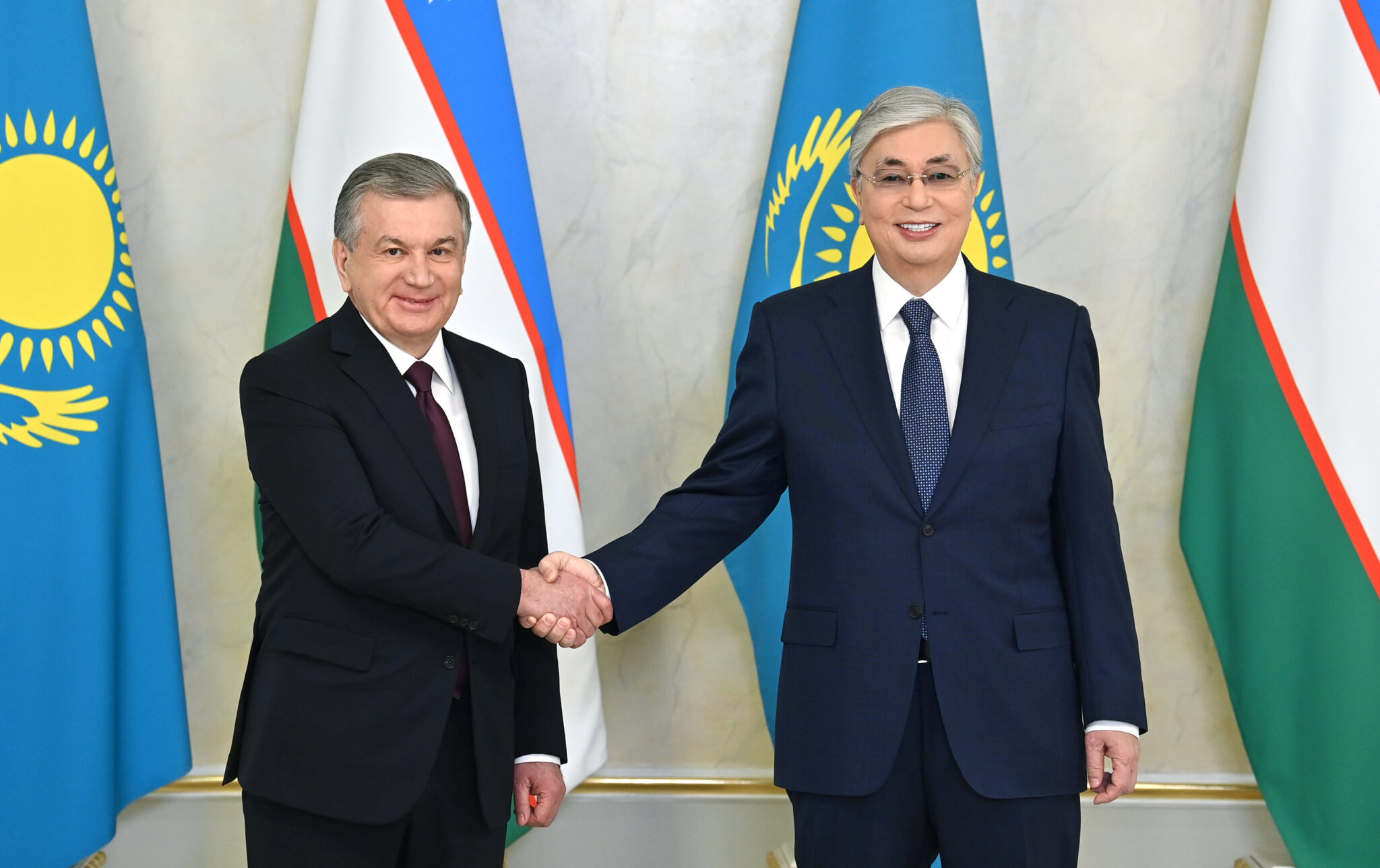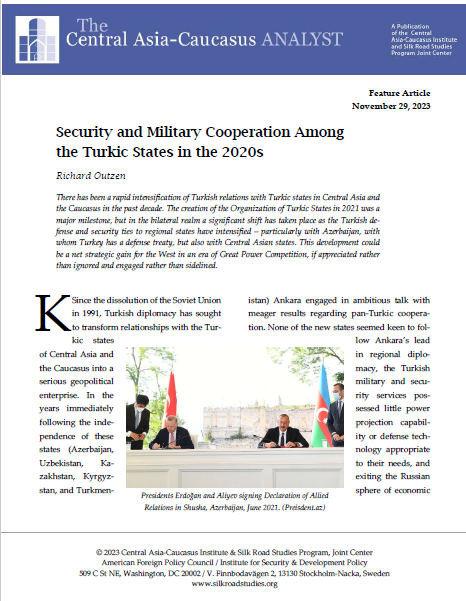Nuclear Power Plant in Uzbekistan: Energy and Geopolitics
By Farkhod Tolipov
August 21, 2024
During a state visit of Russia’s President Vladimir Putin to Uzbekistan in May 2024, after his re-election, it was officially announced that the long-anticipated construction of a Nuclear Power Plant (NPP) received a green light. A corresponding agreement was signed between the Russian Federation and the Republic of Uzbekistan. This decision caused wide public debate about the NPP, regarding its expediency, the environmental and security risks, as well as the geopolitical consequences associated with it. At the same time, the project signifies Uzbekistan’s growing dependence on Russia and a more pro-Russian drift in Tashkent’s foreign policy.

BACKGROUND: The first signals of the possible construction of an NPP in Uzbekistan appeared several years ago. It was then stipulated and justified with reference to the lack of sufficient gas reserves in the country. This pretext surprised many economic experts, political analysts as well as the public since Uzbekistan has for a long time, even during the Soviet period, occupied the highest positions in international rankings of gas reserves and gas production.
The issue of dwindling gas reserves is a big and ambiguous question because neither the government nor specialists have provided convincing explanations for the exhaustion of gas fields in Uzbekistan. Meanwhile, frequent blackouts have become a “normal” phenomenon during last two-three years – roughly corresponding to the period during which the NPP project has been officially promoted. Sudden and frequent blackouts taking place across the country have created the suspicion that they are not so much caused by the inability of existing energy infrastructure to satisfy the country’s growing energy needs and a lack of gas reserves, but are man-made and deliberate in order to convince people that there is no alternative to an NPP.
However, the overall agreements between Uzbekistan and Russia regarding the NPP, including the costs of the plant, environmental aspects, the disposal and utilization of nuclear waste, and many other concomitant questions of interest to the public and media remain opaque and secretive. It was in this context that Putin and Uzbek President Shavkat Mirziyoev announced the official start of the NPP construction project.
Initially, the NPP project was intended to consist of 2 large reactors of 1.2 Gigawatt each, at a cost estimated to US$ 11 billion. However, it has now been decided that the NPP will be a small plant consisting of 6 small reactors of 55 Megawatt each. Overall, the electricity that will be produced by the NPP is supposed to constitute about 15 percent of the total energy produced in the country. The NPP is supposed to become operational in 2033.
IMPLICATIONS: Proponents of the NPP construction argue that nuclear energy is widely used in the world, pointing to France, Germany, Japan, the U.S. and others. According to them, constructing the NPP is in Uzbekistan’s strategic interests and an instrument of sustainable development, since it will positively affect both economic growth and the population’s living standards. Moreover, they say that nuclear power is the only source of energy generation that meets all three pillars of the so-called energy trilemma established by the International Energy Agency – reliability of energy infrastructure; availability of energy for the population and industry; and no harmful effect on the environment.
While these assertions seem aimed to calm the excited public opinion, they do not withstand critical counterarguments. Numerous physicists, environmentalists, energy experts, political scientists and public activists have raised their voices against the NPP. In particular, according to estimates, it will be more expensive to produce electric energy in small reactors than large ones. Uzbekistan will face a large financial burden that will be carried by consumers. Also, according to estimates, Uzbekistan’s renewable energy sources can fully satisfy the country’s energy needs even without the NPP.
Meanwhile, multiple questions related to the construction and operation of the NPP as well as its geopolitical implications have not been addressed and no transparent calculations of key aspects of the NPP’s operation have been provided. These include the enrichment of Uranium from U²¹⁸ to U²³²; the system for cooling the reactor; the utilization of nuclear waste; the overall cost of the project; security aspects; as well as the increased reliance on a Russia that wages a war of aggression against Ukraine and threatens other former Soviet republics with its neo-imperial policy. In addition, the digitalization of the NPP operation raises questions regarding possible cyber-security aspects of the plant, which will definitely be exposed to such threats.
Importantly, this type of small NPP does not exist even in Russia itself, which uses small reactors only for icebreaker engines. Thus, the NPP in Uzbekistan will in fact constitute a first experiment with a number of risks attached.
When journalists and pundits began to inquire about the details of the NPP project and requested relevant information from governmental agencies, they received no response. To the contrary, media organizations were told by authorities that they should refrain from highlighting topics relating to the NPP. Despite the reluctance of government agencies to communicate information on the NPP and attempts to curtail media coverage, social networks and independent experts do discuss the issue and seek to keep it on the public agenda. A special group was even created on Facebook titled “Uzbekistanis are against the NPP.” Simultaneously, a similar NPP project is being discussed in Kazakhstan. In contrast to Tashkent, Astana has officially made it clear that a referendum will be held on NPP construction. However, in Uzbekistan, the decision comes before its justification.
The social and political drama related to the NPP has created the impression that the project corresponds to Russia’s interests rather than those of Uzbekistan. The enthusiasm with which Russia promotes this project cannot be considered and understood independently from the context of Russia’s war in Ukraine. Indeed, the NPP will serve triple objectives for Moscow. First, it will constitute political leverage for exerting pressure upon Uzbekistan. Second, it will provide one among very few instruments for mitigating economic decline and crisis in Russia due to international economic and financial sanctions. Third, it will help creating a false image that Russia is not isolated in world politics and has partners and allies. Given the establishment of a partnership in nuclear energy, Uzbekistan will hardly vote against Russia at future UNGA sessions.
It should be recalled that since 1997, Central Asia is proclaimed a Nuclear-Weapon-Free Zone (NWFZ). The NWFZ by its nature and essence is a broad concept; its ultimate goal is to safeguard the region against any form of nuclear threat. The question therefore arises whether the NPP can be considered a dual-purpose object, which could in certain circumstances be transformed into a weapon? After Russia’s attack on Ukraine’s Zaporizhzhia NPP, this question cannot be ignored and obscured.
Instead, Uzbekistan’s government seems to reiterate Napoleon’s saying: “One jumps into the fray, then figures out what to do next,” or “You commit yourself, then you see.”
CONCLUSIONS: While a number of countries utilize NPPs to produce electricity, most countries resolve their electricity needs by developing alternative energy sources such as solar, wind and hydro. Many countries are also cancelling their nuclear energy programs in favor of renewable sources. The straightforward and very simplistic attempts by proponents of Uzbekistan’s NPP to propagate for the project, in combination with the secrecy displayed by Uzbek authorities, are not only unconvincing but also raise suspicions that Tashkent engages in a mutual geopolitical gamble with Moscow.
The agreement signed between Tashkent and Moscow on the NPP lacks due scientific elaboration and national debates concerning all aspects and risks involved in the deal. Many experts, media as well members of the public are now raising their voices against the project, claiming that Uzbekistan is losing its sovereignty and independence and falling into dependence on Russia.
Indeed, this issue is far from routine and conventional, just like a nuclear weapon is considered a non-conventional weapon. Accordingly, policy in this special area also should be unconventional, taking into account the vital national interests of the country.
AUTHOR'S BIO: Dr. Farkhod Tolipov holds a PhD in Political Science and is Director of the Research Institution “Knowledge Caravan”, Tashkent, Uzbekistan.
The opinions expressed in this article are the author's own.
Friends at Last: The Rapid Rise of Turkey- Uzbekistan Relations
Svante E. Cornell
May 22, 2024
Turkey and Uzbekistan are the two largest countries in the Turkic world. As a result, the rela- tionship between them is a determining factor for the prospects of Turkic cooperation. For most of three decades, the difficulties in the bilateral relationship was a key impediment to Turkey’s influence in Central Asia. Since 2016, however, the arrival of a new leadership in Uzbekistan coincided with Turkey’s turn in a nationalist direction to provide a major boost toward a more fruitful and cooperative relationship. While Turkey’s relations with Uzbekistan have much ground to make up compared to its ties with Azerbaijan and Kazakhstan, the two states have made it priority to do just that.
Russian Influence in Turkmenistan: Rapprochement or Pragmatism?
Slavomir Horak
January 19, 2024
Turkmenistan underwent a serious rapprochement with Russia in recent years, particularly after the establishment of a ruling tandem with Serdar Berdimuhamedow as a formal president and his father, Gurbanguly Berdimuhamedow, who retained significant influence in Turkmenistan’s domestic and foreign policy. Due to a few viable alternatives, Russia represents the balancing factor for Turkmenistan towards the increasing Chinese influence over the country and the principal supporter of the regime. On the contrary, Turkmenistan remains a loyal partner in the region for Russia, where the most significant players (Kazakhstan and Uzbekistan) expressed their cautious approach towards Russia's advance in Ukraine.
Security and Military Cooperation Among the Turkic States in the 2020s
Richard Outzen
December 8, 2023
There has been a rapid intensification of Turkish relations with Turkic states in Central Asia and the Caucasus in the past decade. The creation of the Organization of Turkic States in 2021 was a major milestone, but in the bilateral realm a significant shift has taken place as the Turkish defense and security ties to regional states have intensified – particularly with Azerbaijan, with whom Turkey has a defense treaty, but also with Central Asian states. This development could be a net strategic gain for the West in an era of Great Power Competition, if appreciated rather than ignored and engaged rather than sidelined.
Chessboard No More: the Rise of Central Asia’s International Agency
By Svante E. Cornell and S. Frederick Starr
October 3, 2023
Central Asia is often portrayed through metaphors such as a “Grand Chessboard” or a “Great Game,” which suggest that the players in the game are the great powers, and the Central Asian states are merely pawns in this game. This might have been a plausible argument thirty years ago. But today, thirty years into independence, it is abundantly clear that Central Asian states have agency at the regional and even global level.






